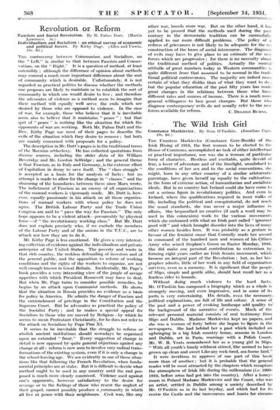Revolution or Reform
THE controversy between Coinmunism and Socialism, on the " Left;" is similar to that between Fascism and Conser- vatism, on the " Right." It is a question of method, at least ostensibly ; although the difference of opinion about methods may conceal a much more important difference about the sort of community which is desirable. rnforturrately, it is not regarded as practical politics to discuss whether the methods one proposes are likely to maintain or to establish the sort of community in which one would desire to live ; and therefore the advocates of violence as a method seem to imagine that their method will equally well serve the ends which are desired by those who are opposed to violence. In the case of war, for example, those who believe that it is inevitable seem also to believe that it maintains " peace " : but that sort of " peace " is nothing like the situation for which the opponents of war are working. Both Mr. Palme Dutt and the Rev. Kirby Page use most of their pages to describe the evils of the situation which they desire to remove ; but both are mainly concerned with proposals for a policy.
The description in Mr. Dutt's pages is in the traditional terms of the Marxian orthodoxy. He has collected quotations from
diverse sources, including the obiter dicta of Sir William Beveridge and Mr. Gordon Selfridge ; and the general theme
is that Fascism, as in Italy. and Germany, is the extreme effort of Capitalism in decay to save itself. The " class struggle " is accepted as a basis for the analysis of facts ; but no attempt is made to allow for the change in " classes " and the obscuring of the boundaries between them since Marx wrote. The indictment of Fascism as an enemy of all organizations of the manual workers is vigorously made. Mr. Dutt is, hew- ever, equally passionate in his attack on all those organiza- tions of manual workers with whose policy he does not agree. The British Labour Party .. and the Trade Union Congress are said to " pave the way for Fascism." The only hope appears to be a violent attack—presumably by physical force—of " the revolutionary working class." But Mr. Dutt does not explain precisely who, if we exclude the members of the Labour Party and of the unions in the T.U.C., are to attack nor how they are to do it.
Mr. Kirby Page is less emotional. He gives a very interest- ing collection of evidence against the individualism and private enterprise of the United States. The poverty and waste in
that rich country, the reckless defrauding of investors and of the general public, and the opposition to reform of working conditions and the rights of the workers to organize, are not well enough known in Great Britain. Incidentally, Mr. Page's book provides a very interesting view of the jungle of savage appetites with which President Roosevelt may have to deal. But when Mr. Page turns to consider possible remedies, he begins by an attack upon Communist methods. He shows that the 'situation in Russia provides no evidence as a basis for policy in America. He admits the danger of Fascism and the entrenchment of privilege in the Constitution and the Supreme Court. Bat he advocates as practical the policy' of the Socialist Party ; and he makes a special appeal for Socialism to those who are moved by Religion—by which he seems to mean Protestant Christianity, for he does not refer to the attack on Socialism by Pope Pius XI.
It seems to be inevitable that the struggle to reffirm or abolish ancient institutions should nowadays be organized upon an extended " front." Every suggestion of change in detail is now opposed by' quite general objections against any change at all : reform is now seen to involve very radical trans- formations of the existing system, even if it is only a change in the school-leaving age. We are evidently in one of those situa- tions like that following the French Revolution, when funda- mental principles are at stake. But it is difficult to decide what method ought to be used in any country until the end pro- posed is much more clearly conceived. Niblenee used against one's opponents, however satisfactory to the desire for
revenge or to the feelings of those who Itsent the neglect of their gospel, cannot possibly produce a community in which all live at peace -with their neighbours. Civil -wars like- any other war, breeds more war. But on the other hand, it has yet to be proved that the methods used during the past century in the democratic tradition can be successfully applied to our more difficult problems. -The policy of a redress of grievances is not likely to be adequate for the re- construction of the bases of social intercourse. The diagnosis of evils may have to give place to an estimate of the new forces which are progressive ; for there is no necessity about the traditional method of politics. Actually the mental t. attitude of great numbers today in Western communities is quite different from that assumed to be normal in the tradi- tional political controversies. The majority are indeed more ' certain of what they dislike than of what they want to do ; but the popular education of the past fifty years has made'. great changes in the relations between those who have different rates and sources of income. There is a much more .general willingness to face great changes,. But those who diagnose contemporary evils do not usually refer to the new










































 Previous page
Previous page